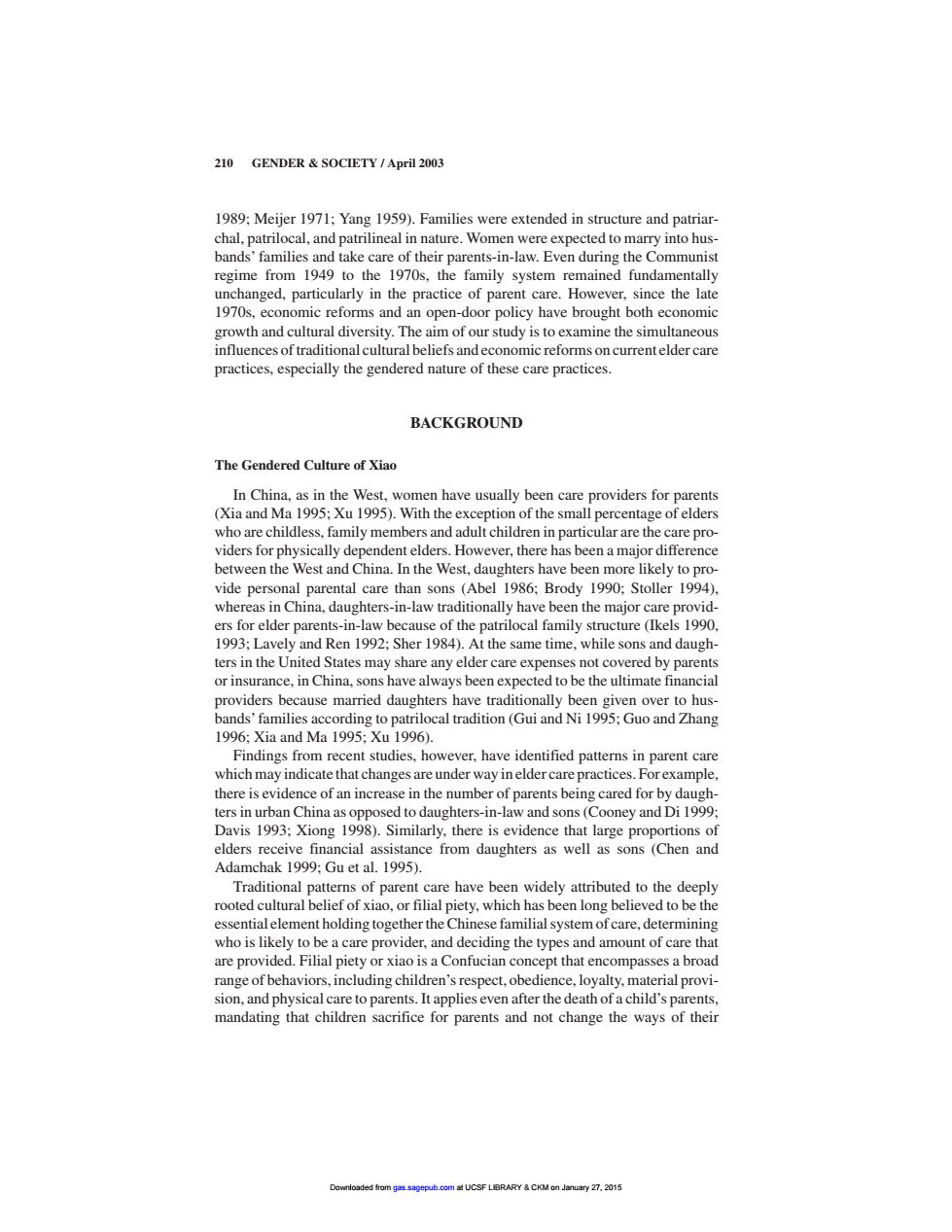正在加载图片...

210 GENDER SOCIETY /April 2003 1989;Meijer 1971;Yang 1959).Families were extended in structure and patriar- chal,patrilocal,and patrilineal in nature.Women were expected to marry into hus- bands'families and take care of their parents-in-law.Even during the Communist regime from 1949 to the 1970s,the family system remained fundamentally unchanged,particularly in the practice of parent care.However,since the late 1970s,economic reforms and an open-door policy have brought both economic growth and cultural diversity.The aim of our study is to examine the simultaneous influences of traditional cultural beliefs and economic reforms on current elder care practices,especially the gendered nature of these care practices. BACKGROUND The Gendered Culture of Xiao In China,as in the West,women have usually been care providers for parents (Xia and Ma 1995;Xu 1995).With the exception of the small percentage of elders who are childless,family members and adult children in particular are the care pro- viders for physically dependent elders.However,there has been a major difference between the West and China.In the West,daughters have been more likely to pro- vide personal parental care than sons (Abel 1986;Brody 1990:Stoller 1994), whereas in China,daughters-in-law traditionally have been the major care provid- ers for elder parents-in-law because of the patrilocal family structure(Ikels 1990, 1993;Lavely and Ren 1992;Sher 1984).At the same time,while sons and daugh- ters in the United States may share any elder care expenses not covered by parents or insurance,in China,sons have always been expected to be the ultimate financial providers because married daughters have traditionally been given over to hus- bands'families according to patrilocal tradition(Gui and Ni 1995;Guo and Zhang 1996:Xia and Ma1995;Xu1996). Findings from recent studies,however,have identified patterns in parent care which may indicate that changes are under way in elder care practices.For example, there is evidence of an increase in the number of parents being cared for by daugh- ters in urban China as opposed to daughters-in-law and sons(Cooney and Di 1999; Davis 1993;Xiong 1998).Similarly,there is evidence that large proportions of elders receive financial assistance from daughters as well as sons (Chen and Adamchak 1999:Gu et al.1995). Traditional patterns of parent care have been widely attributed to the deeply rooted cultural belief of xiao,or filial piety,which has been long believed to be the essential element holding together the Chinese familial system of care,determining who is likely to be a care provider,and deciding the types and amount of care that are provided.Filial piety or xiao is a Confucian concept that encompasses a broad range of behaviors,including children's respect,obedience,loyalty,material provi- sion,and physical care to parents.It applies even after the death of a child's parents, mandating that children sacrifice for parents and not change the ways of their Downloaded from gas.sagepub.com at UCSF LIBRARY CKM on January 27.20151989; Meijer 1971; Yang 1959). Families were extended in structure and patriarchal, patrilocal, and patrilineal in nature. Women were expected to marry into husbands’ families and take care of their parents-in-law. Even during the Communist regime from 1949 to the 1970s, the family system remained fundamentally unchanged, particularly in the practice of parent care. However, since the late 1970s, economic reforms and an open-door policy have brought both economic growth and cultural diversity. The aim of our study is to examine the simultaneous influences of traditional cultural beliefs and economic reforms on current elder care practices, especially the gendered nature of these care practices. BACKGROUND The Gendered Culture of Xiao In China, as in the West, women have usually been care providers for parents (Xia and Ma 1995; Xu 1995). With the exception of the small percentage of elders who are childless, family members and adult children in particular are the care providers for physically dependent elders. However, there has been a major difference between the West and China. In the West, daughters have been more likely to provide personal parental care than sons (Abel 1986; Brody 1990; Stoller 1994), whereas in China, daughters-in-law traditionally have been the major care providers for elder parents-in-law because of the patrilocal family structure (Ikels 1990, 1993; Lavely and Ren 1992; Sher 1984). At the same time, while sons and daughters in the United States may share any elder care expenses not covered by parents or insurance, in China, sons have always been expected to be the ultimate financial providers because married daughters have traditionally been given over to husbands’ families according to patrilocal tradition (Gui and Ni 1995; Guo and Zhang 1996; Xia and Ma 1995; Xu 1996). Findings from recent studies, however, have identified patterns in parent care which may indicate that changes are under way in elder care practices. For example, there is evidence of an increase in the number of parents being cared for by daughters in urban China as opposed to daughters-in-law and sons (Cooney and Di 1999; Davis 1993; Xiong 1998). Similarly, there is evidence that large proportions of elders receive financial assistance from daughters as well as sons (Chen and Adamchak 1999; Gu et al. 1995). Traditional patterns of parent care have been widely attributed to the deeply rooted cultural belief of xiao, or filial piety, which has been long believed to be the essential element holding together the Chinese familial system of care, determining who is likely to be a care provider, and deciding the types and amount of care that are provided. Filial piety or xiao is a Confucian concept that encompasses a broad range of behaviors, including children’s respect, obedience, loyalty, material provision, and physical care to parents. It applies even after the death of a child’s parents, mandating that children sacrifice for parents and not change the ways of their 210 GENDER & SOCIETY / April 2003 Downloaded from gas.sagepub.com at UCSF LIBRARY & CKM on January 27, 2015